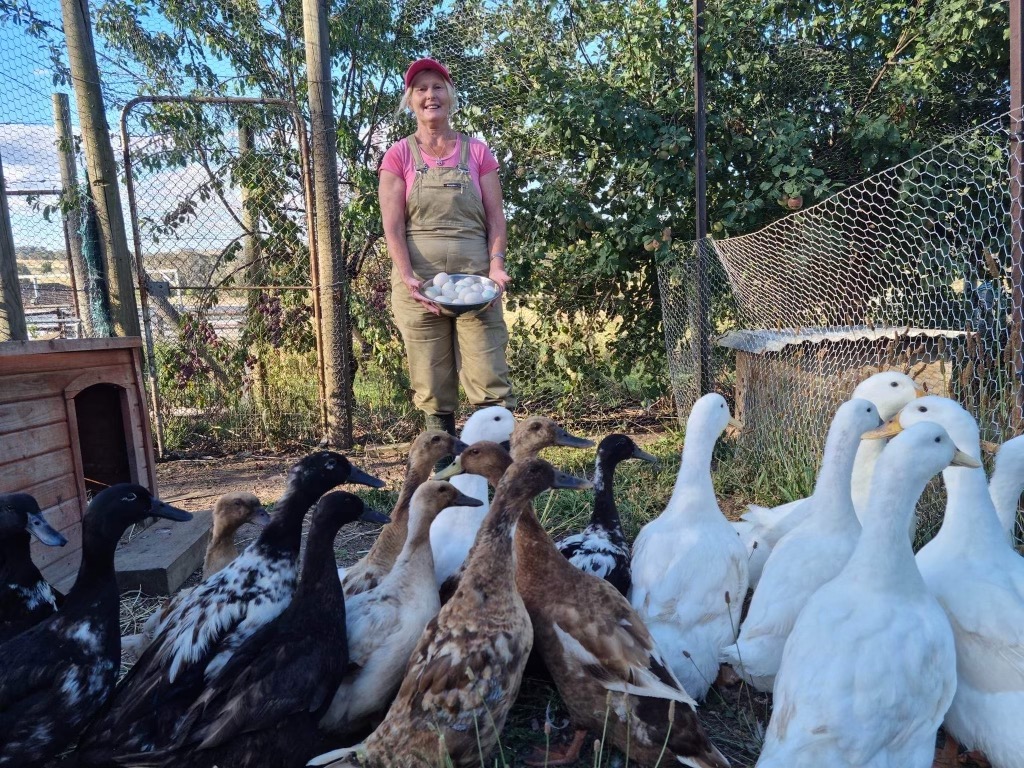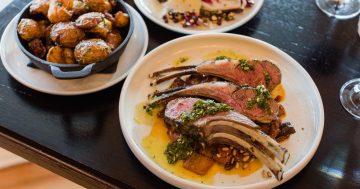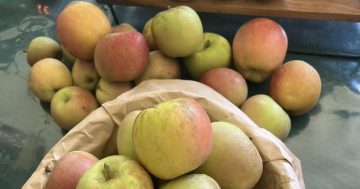
Deb Sainsbury and some of her flock of ducks. The black-and-white Cayuga ducks on the left are excellent layers, as are Peking ducks. Named to reflect their personality, the ducks include Harold, a Peking drake who stands with pride. Naughty male ducks are inevitably called Mongrel. Other names include Omo, Yokes, Maggie, Harley and Rose. Photo: Andrew Sainsbury.
Deb Sainsbury says her ducks are ‘pit ponies’ rather than show ponies. Their job is to lay eggs, rather than being shampooed for the show ring. Last winter, when egg production around the country was disrupted, Deb’s ducks kept on laying.
Across Australia demand for eggs has lurched from low during COVID-19 lockdowns to high as the hospitality sector recovered, helped by the return of international tourist arrivals.
A Coles spokeswoman told Region that customers might not find their usual brand of eggs when they shopped, but offered no reason why supplies were low and limited per customer. “We’re continuing to monitor supply and are working hard with our suppliers to improve availability as quickly as possible,” she said.
At Middle Arm north of Goulburn Deb is more a hobbyist than a commercial egg producer; nevertheless a clutch of Canberra and Goulburn customers have been relying on her ready supply of duck eggs.
“We have Muscovy ducks which are really actually a goose, they are lazy ducks, but they lay giant eggs and we have Peking ducks and Khaki Campbell ducks,” Deb said.
In hammering rain throughout last year the ducks took the weather in their stride and continued to lay, even in winter. “We had duck eggs coming out our ears and I was slopping around in mud because it never stopped raining,” Deb said. “They like to paddle in the mud and with their beaks play in the mud and they get a lot of minerals out of the mud. Ducks need mud and water,” she said.
Always keen for duck eggs, Deb’s customers include Chinese, Vietnamese and Koreans who know how to manage the highs and lows of production. “They put (duck eggs) in salt water in big jars and store them and eat them through the winter when normally, poultry is not laying,” Deb said.
Unavailable from supermarkets, duck eggs can be found at markets and boutique shops and are valued for different reasons.
“There is an enzyme in the duck egg that is different to a chook egg and they can be digested by people with diverticulitis and Crohn’s disease,” Deb said. “I had a couple of ladies who had diverticulitis and Crohn’s buying eggs from me regularly when I worked in Canberra or my husband would drop them off to them,” she said.
But when grain prices kept rising to the point of doubling, Deb had to get rid of half her flock. “My husband pointed out it was $800 for the feed bill one month and we do not sell that many eggs. We were paying a lot of money and not getting much return,” she said.
Parting with 20 of her 40 ducks was not easy. “I had no trouble selling them, it was really hard to choose which ones to sell,” she said. She sold 14 of her flock of 28 chooks, but it was the absence of ducks which was most noticeable. Feeding time had been a cacophony of quacking and still is to a lesser extent.
Foxes plundered her flock and crows stole the eggs when she first arrived at Middle Arm. “It was a massacre, it was just awful, I just stood there in my jammies stunned at the mess around me,” she said. “It took two years to get the courage to buy them (ducks) again.” She also changed the design of her pens.
Another issue keeping her awake at night is the cleanliness of her eggs, storage and refrigeration. “I studied agriculture at school and worked in the food industry and for me, having the eggs stored correctly is really important because of shelf life and because I don’t want to sell anything that is on the turn,” she said.
She boils surplus eggs and feeds them to her dogs or to the poultry for protein. She has given a lot of eggs away to the community pantry in Goulburn. “They go like hot cakes,” Deb said.











